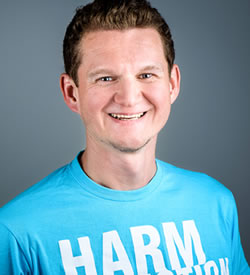

Follow these links to find out more about the Health Policy Project's related work.
- Explore HPP publications that relate to PWID
- Read about HPP's activities in the AME Region, Ukraine, Russia
- Learn about HPP's work involving Key Populations
Organization: Eurasian Harm Reduction Network
Country: Lithuania
Area of Response to HIV: People Who Use Drugs
Interview was originally published in the February 2014 newsletter.
Interview with Sergey Votyaghov
Sergey Votyagov is the executive director of the Eurasian Harm Reduction Network (EHRN) based in Vilnius, Lithuania. EHRN advocates for the universal human rights of people who use drugs and promotes evidence-based harm-reduction approaches to drug use. Votyagov has worked on HIV-related issues since 2004 and became more directly involved in harm reduction advocacy when he joined EHRN in 2010. He was driven by his ambition to push for human rights for people who use drugs in Eastern Europe and Central Asia, where drug users have traditionally been criminalized and excluded. The HIV Policy and Advocacy Monitor spoke with Votyagov about working in this environment and some of EHRN's recent achievements.
EHRN operates in challenging policy environments where drug use and drug users are highly stigmatized. Numerous political, social, and cultural factors affect the provision of basic health services for people who use drugs, and criminalization and discrimination are consistent barriers to healthcare access. For example, opioid substitution treatment is banned in Russia, and many former Soviet countries have repressive policies and law enforcement practices on drug use, which undermine public health and waste public resources.
HIV Policy and Advocacy Monitor: What led you to work in harm-reduction policy and advocacy?
In many countries in Eastern Europe and Central Asia (EECA), there is an environment in which drug dependence is not a health issue, but a criminal concern. There is a need to convince donors and governments that drug dependence issues are a part of a broader public health challenge in the region. I wanted to contribute to strengthening the Eurasian Harm Reduction Network and be a part of this challenging work, promoting harm reduction as the most humane and effective way to protect the health and lives of people who use drugs and to help their communities.
HIV Policy and Advocacy Monitor: Why is policy important for harm reduction?
In some EECA countries, there's a lot of debate about whether harm reduction is an essential service, effective, or even whether it should have a legal base to exist. Law enforcement interprets drug policy as a mandate to restrict a drug user's access to basic life-saving services and to disregard their basic human rights. Violations and discrimination pervade medical settings where drug users seek help. Lack of priority placed on drug user's health and on their communities translates in governments' unwillingness to allocate any funds for harm reduction, which almost fully depend on donor investments in EECA.
HIV Policy and Advocacy Monitor: Can you describe EHRN's policy and advocacy efforts?
A recent success for EHRN is the Civil Society Action Team (CSAT), a project intended to engage civil society in the Global Fund processes. With an HIV epidemic driven by injecting drug use in this region, we wanted to make sure these issues and needs are represented in Country Coordination Mechanisms and Global Fund Board Delegations to help ensure that harm-reduction programs are a part of a country's Global Fund proposals and that countries from EECA continue to be eligible for the Global Fund. This project helped EHRN to be recognized as a key organization in the region that is successfully engaging community representatives and civil society in the Global Fund process. As the Global Fund began implementing the New Funding Model, EHRN was invited to be an early applicant. It will receive a first-of-its-kind Global Fund regional grant fully focused on advocacy for harm reduction and drug user community systems strengthening.
HIV Policy and Advocacy Monitor: What are some positive policy outcomes that you have seen?
There has been progress in many parts of EECA. Moldova, Kyrgyzstan, Latvia, and Estonia have introduced policy changes that allowed for the introduction of harm-reduction programs in prisons. Ukraine has a vibrant civil society that is politically engaged, has successfully influenced policies, and works toward improving domestic spending for HIV services. A few harm-reduction organizations managed to raise funds from their municipal governments to cover the provision of harm-reduction services in Ukraine and even in Russia.
HIV Policy and Advocacy Monitor: What is the role of civil society in ensuring the sustainability of harm-reduction and HIV and AIDS programs?
In 2011, when the Global Fund cancelled Round 11 funding, many countries and organizations faced a wake-up call about the need for diverse funding sources for harm reduction. Civil society has an essential role in advocating for increased domestic spending on harm reduction and working to reduce the stigma around providing much-needed support to people who use drugs. Only through a well-developed civil society and by working with communities can sustainable programs be developed for those most in need.
For more information on EHRN and its work, visit its website at http://www.harm-reduction.org/ and read its recent report "Quitting while not ahead: The Global Fund's retrenchment and the looming crisis for harm reduction in Eastern Europe and Central Asia." (http://www.harm-reduction.org/library/2288-quitting-while-not-ahead-the-global-funds-retrenchment-and-the-looming-crisis-for-harm-reduction-in-eastern-europe-and-central-asia.html)